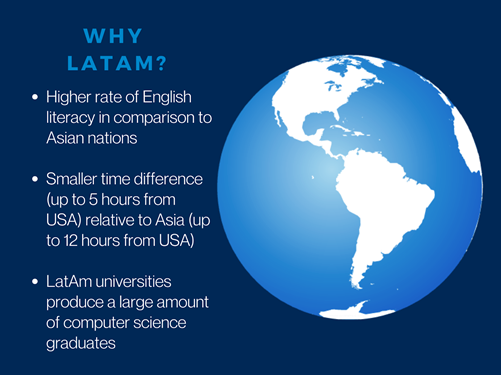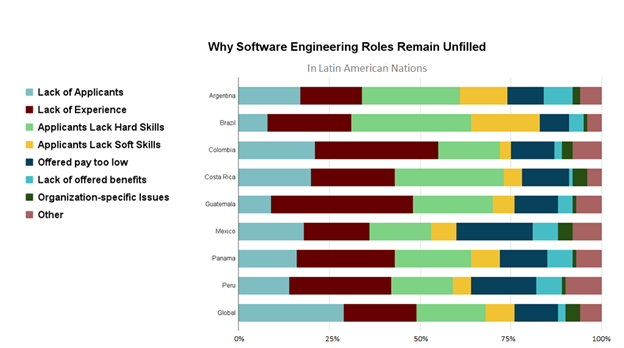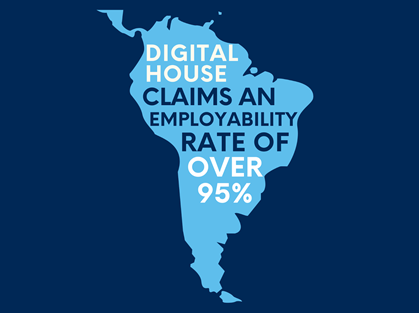LATAM Trends: Developer Academies
Should we expect to see more software companies fund EdTechs to groom talent in high demand regions?
![]()
Overview
The need for people who are proficient in software development has sharply increased throughout the LATAM technology community due the critical role that the skill set plays in the creation of the software applications frequently used by enterprises. In a rapidly advancing world, the need for software developers who can facilitate digital transformation is greater than ever.
This unprecedented demand has led to a shortage of qualified developers in just about every major country throughout the world. As a result, outsourcing has been a necessity for companies to build the software they need to operate and innovate. Historically, this work was outsourced to India and other Asian countries for development. Recently, however, there has been a shift of outsourcing flow to both Eastern Europe and more commonly, Latin America. Brazil, Mexico, and Argentina house the largest number of software developers in the region, making them prime locations for outsourced development.
Increased Demand for Digital Transformation Leads to More Demand for Talent

Essentially, the problem boils down to this: a massive increase in demand for tech-enabled services has led to pressures on the available talent pool – and now, the available talent pool is not large enough.
There are multiple forces in motion culminating in workforce pressures. First and foremost, digital transformation in South American countries is rapidly speeding up the need for technical developers. This has provided a large increase in demand on its own.
Additionally, major developed countries like the U.S. have been shifting their outsourced software development to Latin American Countries. In the United States approximately 65,000 people per year graduate with a computer science degree. In 2019, more than 300,000 new technology jobs opened up (1). While candidates with other types of degrees may also qualify for these types of roles, it is clear that the demand is significantly larger than the supply in the U.S. Due to this deficit, the U.S. and many other countries look elsewhere to fulfill vacancies. Fortunately, LATAM countries have risen to the challenge and delivered the human capital needed.
Unfortunately, this increasing demand has caused a shortage of talent for domestic and regional needs within LATAM. Francisco Alvarez-Demalde, Co-founder and Co-managing partner of Riverwood Capital stated, “In Brazil alone, over 70,000 new IT professionals are needed each year and only about 45,000 are trained annually,” Alvarez-Demalde added, “as a result of such a talent crunch, salaries for IT professionals in the region increased 20% to 30% last year.” His statement further emphasizes the growing global demand for qualified developers.
Why LATAM for Development Outsourcing?

The traditional route for software development outsourcing has been to India for the most part as well as some other Asian countries. Why then are companies deciding to transition their outsourcing to Latin American countries?
One major reason is the difference in time zones. India and other Asian countries have time differences of up to twelve hours. This makes collaborating extremely difficult. There can rarely be effective communication when outsourcing to companies in these regions. In contrast, between the United States and countries in South America the difference usually falls below five hours. This is significantly more manageable and usually will allow for same day communication.
Additionally, another reason for outsourcing to LATAM Countries is the ease of communication. The rate of English literacy in China is approximately 1%. In a country like Mexico this rate is around 4%. This can be a significant advantage for communication and ease of collaboration when describing application specifications.
Finally, Mexican and some other Latin American universities are almost producing as many computer science graduates as American schools. Beyond education, Mexico and Brazil have a combined workforce of just under three-quarters of a million technology specialists. These are all workers that are highly qualified and are also very experienced. This makes them attractive candidates when companies are looking to expand and set up Latin American development teams or to outsource for remote software engineering.

Digital House Steps In
Digital House is a Buenos Aires-based EdTech focused on developing tech talent through immersive remote courses. They specialize in learning in the Tech space and offer courses that range from six months to two years teaching skills such as web and mobile development, data analytics, user experience design, digital marketing, and product development. The organization currently operates in Brazil, Argentina, Chile, Colombia, Mexico, Peru, and Uruguay, and is planning to expand to new countries. Today, 50% of Digital House’s clients are in Brazil, 30% in Argentina, and 20% in other Latin America’s countries.

Nelson Duboscq, CEO and Co-founder of Digital House, said that accelerating demand for tech talent in Latin America has fueled demand for the startup’s online courses. Since it first launched its classes in March of 2016, the company has seen a 118% CAGR in revenues and a 145% CAGR in students. The 350-person company expects “and is on track” to be profitable this year, according to Duboscq. Digital House also grew amid the pandemic, as Sebastian Mackinlay, Digital House’s CEO in Brazil, told LABS: “By the end of 2020, we trained nearly 63,000 students and the expectation for 2021 is to train 42,000 more students, closing 2021 with more than 100,000 trained students.”
This is a significant win for the LATAM region. Companies in this area realize this too. When Digital House looked for funding they did receive some venture funding, like TPG’s Rise Fund’s first investment in Latin America, but the majority of their funding has come from large strategic technology companies in the region like e-commerce giant Mercado Libre and Argentine software developer Globant. These companies operate heavily in Latin America and are smart to provide this funding. As technology native companies, they more keenly understand the labor supply challenges that are currently affecting their service capabilities. To mitigate against this shortage they’ve proactively partnered with Digital House to provide opportunities for employment after students complete their training. Digital House claims an employability rate of over 95%.

Other Technology Education Service Providers
Although LATAM is home to other EdTechs, relatively few of them specialize in the Software Development and Technology space. Overall, there are few competitors who operate in the space, although there are a few strong companies and a few very small companies that do offer these training courses.
One such player that is growing in the Tech Talent space is UOL EdTech, a market leader in South America in the EdTech Space. They provide training courses in the Tech space, but are less specialized, providing training for other areas as well like sales, marketing, and leadership, to name a few. Additionally, their model and target audience is slightly different. They are geared more towards corporate training, which entails partnerships with companies to provide additional training to their workforce. They also provide training for educational institutions in the form of partnerships with universities to provide training for students. UOL EdTech recently made an acquisition of Passei Direto, a peer to peer study platform that has 4-million active users, to bolster their services. The funding to make this acquisition was made available via Softbank’s South American Fund.

UOL EdTech demonstrates that while there is not a huge amount of established players in the space, there is the appetite for these services shown by the growth of these startups and their audiences. The assumption that this market will succeed is further solidified through the investments of venture, private equity, and strategic backers.
The trend does not only apply to South America, but also North America. Wizeline, a top player in the IT Services space, utilizes their Wizeline Academy to leverage and get the best out of their local talent pool. The Wizeline Academy was founded in 2017 and has multiple locations in Mexico. Since its inception, more than 23,000 students have graduated from its programs. Students can choose from over 194 courses in artificial intelligence, user experience design and software development, technical writing, project management, leadership, and more. Most courses and seminars are now available to students around the world via live stream and on-demand. Wizeline breaks their services down into 3 buckets: 1) talks, 2) workshops, and 3) bootcamps. Talks are free and available to the public. During these seminars, industry experts offer deep dives into various tech-related topics. Workshops are 2.5 hours and help 20-40 students develop specific skill sets. Finally, Bootcamps are 16+ hours with deep dives into various skills and they also include tailored coaching.
An additional solution developed in recent years came in 2019. Coursera, a global EdTech, partnered with the Universidad de los Andes in Colombia. The program that was created was the first fully online Masters of Software Engineering in Latin America.The goal of this partnership was to help mitigate the critical shortage of talent in the region. Coursera cites that in 2019, there was a shortage of 450,000 IT professionals in Latin America.
What Does this Mean for the LATAM Region?
![]()
This is an extremely important development for the LATAM region. In recent years we have seen more and more attention shift to South America in the IT Services industry, and more specifically, in the outsourcing of software development to a more viable nearshore solution. Due to this drastic increase in demand for developers, both domestically and abroad, LATAM is now facing a skilled labor force shortage. However, with platforms like Digital House, it could be a stepping stone to providing the supply of qualified individuals needed to tackle the modern technology implementation problems. If countries like Argentina and Brazil continue to train higher numbers of developers, it will continue to solidify them as leaders in the IT Service space on the global stage.
Future M&A Activity in the Region
We have already seen an increase in M&A activity in Latin America. Total transactions in the LATAM IT Services space has grown from 81 in 2019 to 118 in 2020. Additionally, we have already seen 52 transactions in 2021 and are on track to match, if not beat, 2020 numbers. With the emergence of companies like Digital House pushing forward the expansion of qualified tech professionals, we should only see tech companies continue to flourish in Latin America with more M&A activity likely not far behind.
7MA Transaction Experience
7 Mile Advisors acted as the exclusive sellside advisor to Belatrix Software (“Belatrix”), a leading agile product development company with nearly 20 years of experience and a presence in Peru, Colombia, Spain, the United States, and Argentina, in their sale to Globant (NYSE: GLOB), a digitally native technology services company based in Argentina. For more information on M&A in the Emerging Markets sector, or to see what strategic options may be available to you, please reach out to our Latin America coverage team.
7MA LATAM Deal Experience

About 7 Mile Advisors
7 Mile Advisors provides Investment Banking & Advisory Services to the Business Services & Technology industries globally. 7 Mile Advisors advises on M&A and private capital transactions, and provides market assessments and benchmarking. As a close-knit team with a long history together and a laser focus on our target markets, 7 Mile Advisors helps its clients sell companies, raise capital, grow through acquisitions, and evaluate new markets. For more information, including research on the M&A markets, visit www.7mileadvisors.com.
Sources:
Why Latin American Developers are 400% more popular than 5 years ago Argentina’s Digital House has raised over $50M to help solve LatAm’s tech talent shortage Argentina’s EdTech Digital House secures $50 million in Mercado Libre led round Universidad de los Andes Will Develop Latin America’s First Top-Tier Online Master’s in Software Engineering on Coursera Sources of Data on Digital Talent in Latin America and the Carribean Wizeline Developer Academy
